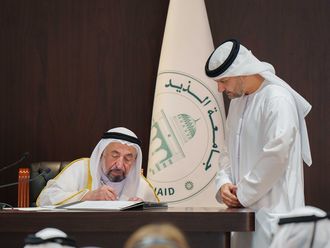
The information highway no longer is a distant route but a path that works its way right through our homes and offices, and as such, it is redefining the role of mass media communication in our lives. In no other period in history has mankind been given such an astonishing diversity of mediums to convey, and receive, information as in the present times.
Today modes of communication include internet, online and social media, smart phones, print media, films, radio, television and more. It is not surprising then that mass communication is the rising star in career pursuits for the youth.
The thing about mass communication: faculty views
Dr Franziska Apprich, Chair of the Communication Program, School of Liberal Arts and Sciences, Canadian University of Dubai, says mass media has started to become an essential part of our lives.
“Particularly, the political and social challenges arising in the region over the past few years have created opportunity for debate and analysis – the students are trained for this. Exchange of ideas is crucial to an informed and healthy society. It is important that these ideas are not only shared, but also debated.”
This course prepare students to take up career across more than one area in media and corporate communication. It also enhances the student’s understanding on the role of media and how to make use of media or create media.
Mohammad Ayish, Head of the Department of Mass Communication, American University of Sharjah (AUS), says, mass communication field of study has attracted young men and women aspiring for leadership roles in their communities and beyond in the UAE.
Ayish adds, “Every single college or university across the UAE has evolved its own mass communication program to meet the growing needs for professional communicators in a thriving media market. Program enrollment ranges from 300 to 1500 across different institutions of higher education with public relations and online media being the most attractive.”
“Those programs have been launched on the basis of solid evidence relating not only to growing market needs, but to positive attitudes, especially among females, towards this discipline as a means of social and professional empowerment. Available statistics show a rise in female-dominated enrollment in mass communication programs, especially in public relations, where job opportunities in government and private sectors are believed to be higher than in other professional communication streams.”
Mass communication needs in the UAE: in public and private sectors
Since the establishment of the UAE federation in 1971, media has been a central player in the country’s national development, says Ayish. “Belief in the power of communication to promote sustainable socio-economic and cultural development has always defined transitions in the media industry."
The UAE public sector at federal and local levels has been most receptive to media talents to bolster national efforts to establish enduring and credible relations with diverse publics, says Ayish.
“The establishment of government communication departments at federal and local organisations reflects this type of attitude,” says Ayyish. “Government communication departments perform a wide range of functions relating to media production, event management, media relations, social networking, and interpersonal communications to promote government achievements among target publics. Some government communication personnel also engage in communication campaigns to promote public awareness of health and traffic issues. Government-operated media organisations are also on the lookout for media talents in journalism, broadcasting and digital production. Government media organisations also have a cultural function to fulfill in terms of fostering national identity among UAE publics,” says Ayish.
The private media sector’s need for professional communicators could not be less compelling says, Ayish. “With its thriving private media industries taking the lead in communication innovation, the UAE has much to offer to aspiring young communicators. The UAE prides itself on being the most media-rich country in the Middle East. It is home to several media free zones like Dubai Media City, Abu Dhabi Media Authority (TwoFour-54), Fujairah Media City and Ras Al Khaima Media City.”
Career options
Mass communications offers amazingly diverse choices of specialisation. Pick your areas of interest from the highly creative options.
- Newswriting and reporting,
- Translation,
- Print layout and design,
- Photojournalism,
- Broadcast news anchoring,
- Broadcast news editing and reporting,
- Video editing,
- Press release writing,
- Info-graphics,
- Digital content generation and management,
- Social networking,
- Advertising copywriting,
- Event planning and management,
- Market research
Campaigning strategies
“Media cities across the UAE house hundreds of mass communication operations in print, broadcast, digital, advertising, public relations and publishing sectors, some of them with a global stature like CNN, Skynews Arabia, Forbes, MBC Group and Al Arabiya Channel.
Who should do the course?
1. If you have the flair for writing.
2. Like to look into core details of any subject.
3. Want to make positive change in the society.
4. Love to share your opinion.
5. Are passionate about storytelling.
6. Want to communicate to the masses.
Do you have the aptitude for Mass Communication?
To be able to compete for those jobs, Ayish says, students have to be:
1) Bilingual.
2) Multifunctional.
3) Possess effective communication skills and global attitudes.
“Academic programs that meet evolving market needs for talented communicators are those drawing on liberal arts education (interdisciplinary); providing credible on-campus and off-campus professional training; and maintaining a solid community outreach and industry relations,” says Ayish.
Campus overview
Spencer Semple, Marketing and Communication Manager, Canadian University of Dubai (CUD) says, “One of CUD’s partners, Brock University (in St. Catherines Ontario) has an outstanding Mass Communication program. Through cooperation with their team, we were able to bring that curriculum here and obtain accreditation from the Ministry of Higher Education and Scientific Research. The great benefit of this is their curriculum is state-of-the-art and also having the majority of courses in common with Brock allows easy transfer for our students – whether it is for a semester abroad or degree completion in Canada.”
Semple says the objective of the course is always to cater to the needs of the market and to try to identify future trends, so four years from now, we are graduating students into high-demand sectors, as Mass Media and Communication is definitely one of these sectors, especially in Dubai.
The other big trend regionally is the overwhelming demand for qualified Arabic journalists – that led us to seek accreditation for the program in Arabic as well. We are fortunate to have some great Arabic lecturers such as Dr. Taleb Kanaan, Senior Anchor of Al Arabiya that bring real world experience into the classroom.
“In addition, we have an industry-standard TV studio on campus in the form of CUDTV the allows students to practice their skills and be involved in the real production of documentaries, news casts etc. It’s a great tool that combines traditional media like TV with new-age digital media like YouTube and Facebook,” says Semple.
The course structure
At CUD, the Bachelor of Arts in Communication is available in Arabic and English with three sub-concentrations areas: Journalism, Advertisement, Public Relations and each one has its own specialised courses, explains Semple.
The first four semesters for all Bachelor of Arts in Communication programs include:
Semester 1 - Introduction to Mass Communication
Semester 2 - Media Ethics and Laws
Semester 3 - Media Psychology
Semester 4 - Principles of Management and Economics
Elective wise specialized courses from 5th semester
In Journalism
Semester5 - Online Journalism and Layout and Graphic Design
Semester6 - News Editing
Semester7 - Journalism Elective
Semester8 - Graduation Project in Journalism
In Public Relations
Semester 5 - Public Relations Campaigns and management
Semester 6 - Public Relations Elective
Semester 7 - Applied Public Relations and Organisational Communication - Graduation Project in Public Relations
Semester 8 - Graduation Project in Public Relations
In Advertising
Semester5 - Print Advertising and Advertising Copy Writing
Semester6 - Advertising Campaigns and strategies
Semester7 - International Advertising and Advertising Elective
Semester8 - Graduation Project in Advertising
Course duration
4 Years (8 Semesters)
Credential
Bachelor Degree Programme
Other prerequisites, if any:
1. UAE High School Certificate or its equivalent with a minimum average score of 60%.
2. TOEFL 500 or IELTS 5.0 or equivalent for English, and TOEFL 450 or IELTS 4.5 for Arabic Courses.
Cost (approx) at CUD
Dh43,963.00/per year
Courses open for admissions:
1. Admission starts from - Fall every year (September) and also in the Spring and Summer semesters
2. Apply online at: http://www.cud.ac.ae/ApplyOnline
3. In person: Visit CUD campus for a personal tour, and complete an application.
4. Email apply@cud.ac.ae
Other universities in the UAE that offer Mass Communication courses
Murdoch University in Dubai, Manipal University Dubai, American University in Dubai, Abu Dhabi University to name a few.












